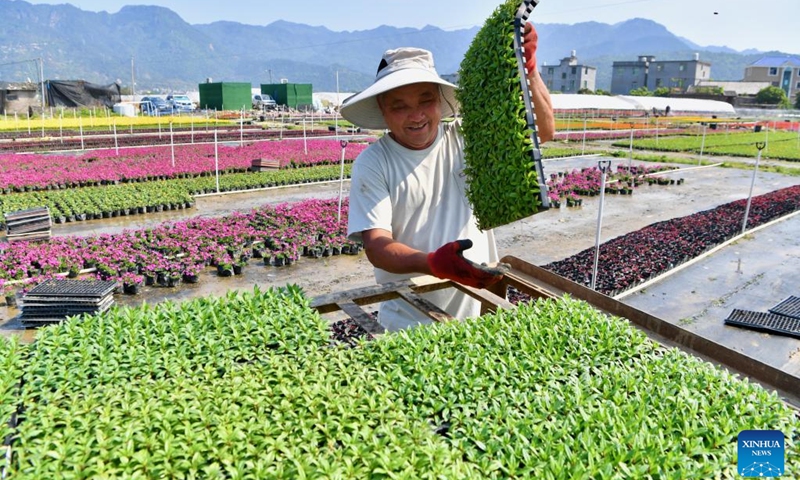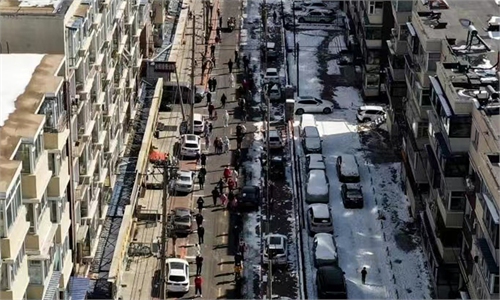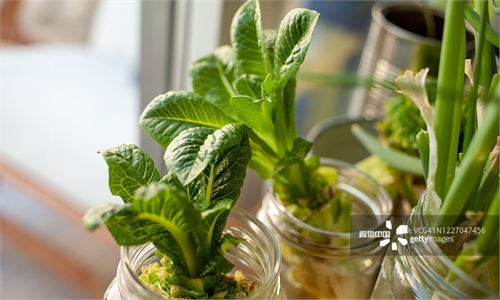
A farmer transports flower seedlings at a vegetable and flower planting base in Nantong Township of Minhou County, southeast China's Fujian Province, April 12, 2022.(Photo: Xinhua)
China's vegetable supply is gradually coming back to normal in COVID-19-affected areas after some fluctuations in recent days caused by interrupted logistics amid flare-ups, but the impact lingers to some extent, according to farmers and industry sources.A vivid example of this phenomenon is Shouguang, a city in East China's Shandong Province and also a major vegetable and fruit producing base, which has reportedly seen some market turmoil in recent days including low-price dumping. According to local farmers, such fluctuations have eased to a great extent after the local government took measures to guarantee logistics, but the impact has not been entirely eliminated.
Hou Xiangjun, a staff member of a grain cooperative in Shouguang, told the Global Times that the retail prices of fruits and vegetables are generally low, as COVID-19 had a negative impact on demand and shipments.
"Because of the COVID-19 outbreak, logistics and market demand have faced some negative effects. Logistics systems were halted for some time and have not yet fully recovered. Customers who buy our products also dropped in number to some extent," Hou said.
A manager surnamed Fan who works for the Liangze fruit and vegetable cooperative in Shouguang nevertheless told the Global Times on Sunday that although logistics costs have risen, there haven't been many major changes in fruit and vegetable prices.
Shouguang is one of China's largest vegetable bases, producing 10,000 tons of vegetables on a daily basis, including tomatoes and chili. It supplies food for regions, including the cities of Chengdu and Chongqing.
The city detected a COVID-19 case on March 16, which caused the region's biggest agricultural products logistics park to be shut down. The local government further upgraded its anti-epidemic management and control to stamp out the virus, which restricted logistics operations for some time.
"Now fruit and vegetable deliveries are back to normal in Shouguang. Parcel delivery has also gradually become normal, whereas people could only deliver by SF Express in the past few days," a staff member from a fresh fruit and vegetable wholesaler based in Shouguang told the Global Times.
According to media reports, Shouguang has taken measures to safeguard vegetable/fruit logistics while strengthening coronavirus controls. For example, officials have asked local vegetable farmers to wear gloves and masks when they pick up or package vegetables, so that people don't have direct contact with the products.
Local officials have also designated special green channels for vegetable transportation vehicles, while organizing hundreds of drivers and automobiles as reserve forces for vegetable transportation.
In other places, authorities also took measures to crack down on vegetable price speculation and stabilize consumer prices. For example, in Shanghai where closed-loop management is currently applied, the police are investigating price gouging in Chongmin district, Shanghai's major vegetable supply region.
Jiao Shanwei, editor-in-chief of cngrain.com, a website specializing in grain news, told the Global Times that China's vegetable production has no major supply issues.
"These are just abnormal and temporary fluctuations. After the epidemic wanes, I believe vegetable prices will correct very quickly," he said.


